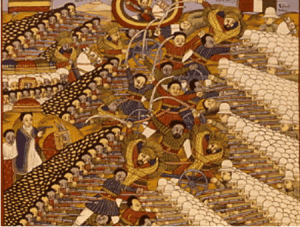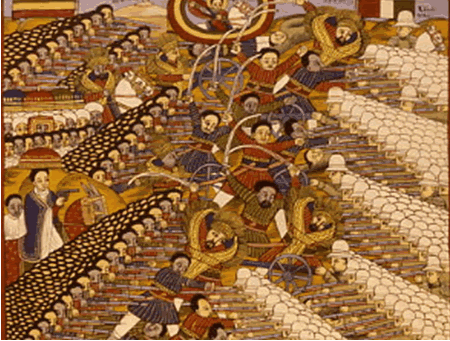March 2

In the 1890s, Italy, once the seat of an Empire that stretched through three continents, held only two small colonies on the Horn of Africa, which it had won with aid from Ethiopia.
Apparently the amity treaty between Ethiopia and Italy, signed by Menelik II of Ethiopia in 1889, contained a discrepancy in the Amharic and Italian translations, the latter of which established Ethiopia as an Italian protectorate.
Menelik denounced the treaty, prompting Italy to invade. Menelik had built up an arsenal of weapons from Britain and France, and even Italy over the previous years. Menelik appealed to France for support, but France refused to negate Italy’s territorial claims.

It was at the Battle of Adwa on March 1, 1896 that Menelik’s forces of approximately 100,000 met with a surprisingly outnumbered Italian army of 17,000 under Oreste Barratieri. Barratieri had completely underestimated the opposing army’s numbers as well as their armed capabilities. Due to this and tactical mistakes on part of Barratieri, Menelik’s army completely obliterated the Italian forces in one of the most stunning defeats of any European power in Africa. After news of the humiliating battle hit Rome, the Prime Minister was forced to resign, and Italy forsook further territorial ambitions for 4o years.
Ethiopia would not be successfully invaded until 1936 when Benito Mussolini, anxious to prove Italy a superpower to its European neighbors, set his sights on Africa’s yet unconquered nation. Mussolini had seen the League of Nations’ impotence at handling border clashes between Italian Somalia and Ethiopia, and European powers were vying for Italian support against Adolf Hitler and Germany. This time the Italian army was much better equipped and had no qualms in using chemical weapons.
The League of Nations Geneva Protocol (signed by Italy) banned the use of mustard gas, but “on 10 October 1935, Rodolfo Graziani first ordered his troops to employ chemical weapons against Ras Nasibu’s troops at Gorrahei.” Italy continued to do so throughout the Italian-Ethiopian war. British and Ethiopian troops forced Italy out of Ethiopia in 1941. Two years later “London created the United Nations War Crimes Commission, but excluded Ethiopia for fear it would initiate proceedings against Pietro Badoglio,” who, as Italy’s new Prime Minister, had become a valuable asset to the Allies when Italy switched sides.
— (Historical Dictionary of Ethiopia by David Hamilton Shinn and Thomas Ofcansky)
The Battle of Adwa remains to this day a symbol of African resistance against colonialism.
The Battle of Adowa: www.rastaites.com/Ethiopia/adowa.html
Ethiopia Celebrates 112th anniversary of Battle of Adowa Victory


I am very sad that you did not write about Pulaski Day. I’m observing it for the first time, as Chicago schools are closed &, feeling the need to know more about the brave exploits of Casimir Pulaski, I thought of your blog. *sniff*
You talked me into it.
Casimir Pulaski Day
The greatest victory for African arms over European colonization, in historical terms it far surpasses the Zulu Wars.